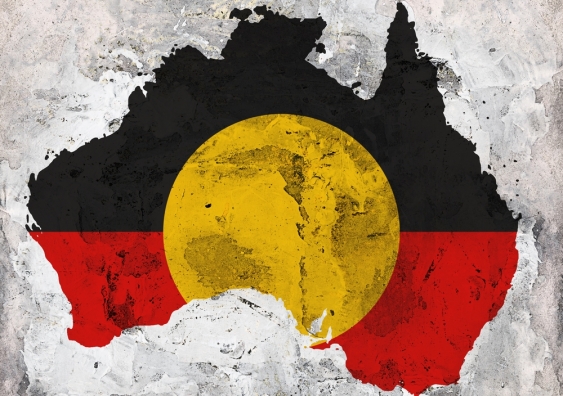First Peoples First
Supporting the sovereignty and rights of Indigenous peoples is core to food sovereignty, and AFSA is committed to doing this in Australia as well as internationally. ‘First Peoples First’ reflects AFSA’s position that a full return of Indigenous sovereignty must be a highest priority of all Australians, and that the food sovereignty movement in a colonised country like Australia must prioritise work to decolonise our food and agriculture systems.
For many years, the Australian Food Sovereignty Alliance (AFSA) has been working to understand how to put First Peoples first in our considerations of what food sovereignty can and should look like in a colonised country like Australia. While we feel we have been making progress, we know as a historically and currently non-Indigenous led organisation, we still have a lot of listening and learning and acting to do.

To do this, AFSA works to:
- Actively support First Peoples’ food sovereignty through promotion of enterprises and programs supporting Indigenous sovereignty, and through building partnerships to support these.
- Pay the Rent: AFSA recognises that we live and work on unceded land. In acknowledgement of First Peoples’ sovereignty, AFSA pays a percentage of our revenue each quarter to Indigenous-led organisations.
- Advance the awareness and understanding of First Peoples’ history and ongoing issues among our Committee and members through training, ongoing discussion, and solidarity sessions.
- Increase members’ ability to build relationships with First Peoples and act in solidarity around local issues and struggles.
- Provide free AFSA membership for First People.
- Reflect the priority of First Peoples First in opening all meetings, events, and discussions with an acknowledgement of country, and placing work on First Peoples First as the first item on all agendas, and encouraging members to do the same.
Read our living document – the First Peoples First Strategy. We welcome feedback – just drop us a line at admin@afsa.org.au
Help us Pay the Rent
Pay the Rent is an organisation based in the Kulin Nation, Victoria, doing crucial work in bringing First Nations and non-First Nations people together to raise funding for grassroots campaigns or causes that protect the rights of First Nations Peoples.
As farmers, we understand the significance of working on stolen land, particularly with regard to how we use this land and its precious resources to grow and produce food. Last year, AFSA launched its First Peoples First Strategy as a roadmap towards decolonising Australia’s agricultural and food systems, and First Nations sovereignty. We are calling for recommendations from AFSA members to help us select an Indigenous-owned and led organisation to pay the rent to.
You can submit your recommendation below, with the chosen recipient to be selected through a transparent process in collaboration with AFSA members.
Food Sovereignty Must Put First Peoples First
Tammi Jonas
For many years, the Australian Food Sovereignty Alliance (AFSA) has been working to understand how to put First Peoples first in our considerations of what food sovereignty can and should look like in a colonised country like Australia. While we feel we have been making progress, we know as a historically and currently non-Indigenous led organisation, we still have a lot of listening, learning and acting to do.
For many years, the Australian Food Sovereignty Alliance (AFSA) has been working to understand how to put First Peoples first in our considerations of what food sovereignty can and should look like in a colonised country like Australia. While we feel we have been making progress, we know as a historically and currently non-Indigenous led organisation, we still have a lot of listening, learning and acting to do.
This year for Fair Food Week – and every day and every year of our work for food sovereignty – our theme will be First Peoples First. What follows are some of our collective reflections on Australia’s history of dispossession of the Original Owners and what our movement can do to work for Indigenous sovereignty, while also working for food sovereignty for settler descendant and more recent migrant Australians.
The Traditional Owners of what is now known as Australia recognise that ‘the land is the Law’ from which everything is derived, and to which everything and everyone has an obligation of care. When a people’s relationship to rivers is as a fellow cosmological traveller – an Elder in a story much longer than any human lifespan – it fundamentally changes the existential question of how we treat our rivers. The same applies to the land, the sky, and everything in between. This way of being-with-others in the world fosters what is called a custodial ethic.
There is often an astonishing generosity from First Peoples in Australia towards settler descendants and recent migrants in the face of ongoing colonisation of unceded Aboriginal lands – a generosity Indigenous scholars have written is born of the same ways-of-being at the root of the custodial ethic. Mary Graham, a Kombumerri person, and her settler colleague Morgan Brigg (2021) recommend moving forward with ‘autonomous regard’ between Indigenous and settler peoples, ‘which can be an ethical relation that acknowledges and sits with the brutality of dispossession through settler colonialism.’ In the same vein, author of Sand Talk: How Indigenous Thinking Can Save the World and Apalech person Tyson Yunkaporta tells audiences ‘don’t talk about your settler fragility all the time, think about your human becoming’ (2020).
First Peoples have no obligation to settlers to offer this generosity, and some instead proffer sharp rebuffs that ‘decolonisation is not a metaphor.’ In North America, Tuck and Yang write, ‘The absorption of decolonization by settler social justice frameworks is one way the settler, disturbed by her own settler status, tries to escape or contain the unbearable searchlight of complicity, of having harmed others just by being one’s self’ (2012: 9). In this postulation, there can be no decolonising solidarity nor restitution without an unmitigated and material return of Indigenous sovereignty over land and life.
We accept and promote that a full return of Indigenous sovereignty must be a highest priority of all Australians. We also reflect on the words of author Bruce Pascoe, a Yuin, Bunurong, and Tasmanian man, speaking with AFSA at the Food Sovereignty Convergence at the Canberra City Farm in 2017. He offered the provocation, ‘Black people aren’t going anywhere. White people aren’t going anywhere. So what are we going to do about it?’
In the context of non-Indigenous and Indigenous peoples working towards an agroecological transition in Australia, AFSA asks ‘so what are we going to do about non-Indigenous peoples farming on Aboriginal lands?’
In Dark Emu (2014), Bruce Pascoe asserts that Aboriginal people were farming before colonisation. His popular thesis has contributed to a heated debate about whether the Original Owners were farmers or foragers, unfortunately too-often framed in an anachronistic and damaging social evolutionary argument that ‘mere’ foragers are somehow less evolved than farmers. Pascoe’s work has made critical contributions in its demand that settler Australians grapple with the ongoing existence and potential and actual competing land occupation of Indigenous and non-Indigenous peoples. However, it has also contributed to a more impoverished debate that does not acknowledge the cosmological world view and deeply respectful way of caring for country – of being with and of country – of Aboriginal people, which holds regardless of how First Peoples grew, harvested, or hunted for food.
Amongst other things, AFSA is asking how to ‘stay with the trouble’ (Haraway 2016) and work to achieve both Indigenous sovereignty and food sovereignty for everyone, and how to use a relational ethic in a meaningful and grounded way to get there. That is, we are working with farmers and allies who are embracing and espousing a custodial ethic to understand how they are currently, or may be able to extend their care for land to care for its Original Owners, bringing settler descendants full circle to find ways and means of restitution of land and rights to First Peoples.
Christopher Mayes in his 2018 Unsettling Food Politics claims ‘that many of the critiques of industrial agriculture and the corresponding proposal for small-scale agrarian agriculture fail to make the reflexive step of considering the role of both small and large agriculture in colonial dispossession and the continuation of this legacy’.
AFSA takes up the challenge in Mayes’ critique and is looking to what he identifies as failures to decolonize agriculture within the food sovereignty movement, and whether and how agroecological farmers are working to redress these historical failures. Deborah Bird-Rose asserted that guilt is related to ‘one’s own actions’, whereas responsibility is ‘the human condition of living with and for others’ (2004: 12) – making all non-indigenous people responsible for but not necessarily guilty of Australia’s often violent dispossession of Aboriginal people. We embrace our responsibility and aim to support farmers and landholding allies to do the same.
Food sovereignty was launched into public political discourse by La Via Campesina at the World Food Summit in Rome in 1996, as a global movement of peasants, small and medium size farmers, landless people, rural women and youth, Indigenous peoples, migrants, and agricultural workers. In the words of scholar Philip McMichael, ‘food sovereignty emerged as the antithesis of the corporate food regime and its (unrealized) claims for “food security” via the free trade rules of the World Trade Organization (WTO)’ (2015: 934). Today, the food sovereignty movement remains a peoples’ movement to regain control of our food and agriculture systems. In colonised countries like Australia, settler descendants have work to do to ensure the movement puts First Peoples First. As a national alliance, AFSA is working harder each day to do that, and we invite all our members to do the same.

